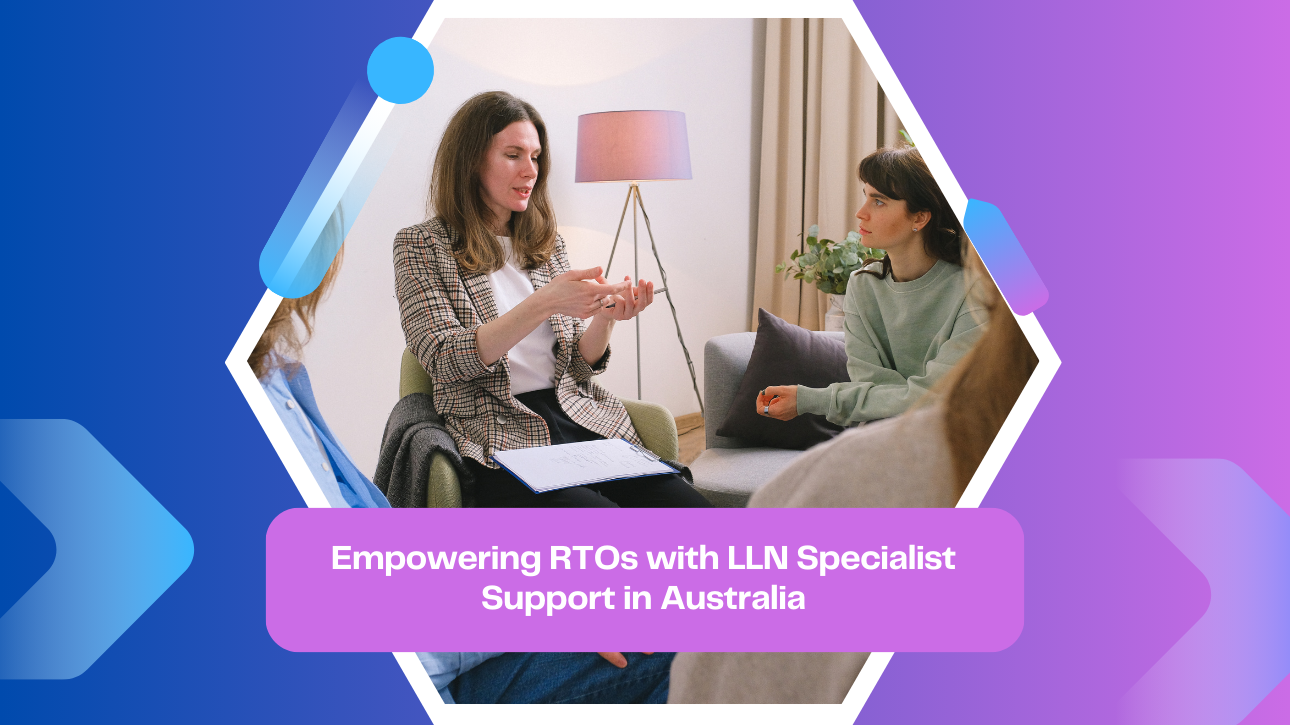In Australia, the vocational education and training (VET) sector plays a crucial role in shaping the workforce and ensuring individuals are equipped with the skills needed for success across various industries. However, for many learners, particularly those from disadvantaged backgrounds or with low levels of literacy, numeracy, and language (LLN), succeeding in these programs can be a significant challenge. This is where LLN (Language, Literacy, and Numeracy) specialist support comes into play. By empowering Registered Training Organisations (RTOs) with the right LLN expertise, Australia can improve learning outcomes, increase engagement, and help close the skills gap across sectors.
The LLN Challenge in Vocational Education
LLN issues are not just about basic reading, writing, or mathematical skills. They also encompass the ability to understand and apply complex concepts, follow workplace instructions, communicate effectively with colleagues and supervisors, and understand regulations and safety requirements. Without a solid foundation in these areas, learners face considerable barriers in completing their training, obtaining qualifications, and gaining meaningful employment.
Unfortunately, many RTOs struggle to provide adequate support for students with LLN needs, largely due to a lack of specialised expertise and resources. According to a blog from VET Resources, addressing these challenges is crucial to ensure all students can access, participate in, and complete their vocational training successfully.
The Role of LLN Specialists
LLN specialists are professionals with expertise in language, literacy, and numeracy support, often including strategies to meet the needs of learners with diverse backgrounds. Their role is to assist RTOs in identifying and addressing the LLN barriers faced by students, ensuring that learners can fully participate in their training programs and achieve the required competencies.
There are several ways in which LLN specialists can support RTOs:
- Assessment and Diagnosis: LLN specialists can conduct initial assessments to identify students’ LLN levels, helping RTOs determine where additional support is needed. This could involve the use of tailored diagnostic tools that pinpoint specific areas where learners are struggling—whether it’s basic literacy, numeracy, or more complex language skills related to the training program.
- Customised Learning Strategies: After identifying the gaps, LLN specialists work with RTO trainers and assessors to create tailored learning strategies. These may include modifying course content to make it more accessible, using plain language, providing visual aids, or offering supplementary learning resources to reinforce key concepts.
- Training RTO Staff: LLN specialists also provide training for RTO staff, equipping them with strategies and tools to support learners with LLN needs. This professional development ensures that trainers are better prepared to work with diverse student populations and can integrate LLN support into their teaching methods effectively.
- Creating a Supportive Learning Environment: Ensuring that students feel comfortable asking for help and are encouraged to overcome challenges is crucial. LLN specialists can help RTOs foster a positive and supportive learning environment, where students are not afraid to seek assistance with language or numeracy tasks.
- Monitoring Progress: With LLN support in place, specialists can also track students’ progress, offering continuous feedback and adjusting strategies as necessary to ensure improvement. This ongoing support helps prevent students from falling behind and increases the likelihood of successful course completion.
Benefits of LLN Specialist Support for RTOs
For RTOs, the benefits of empowering staff with LLN specialist support are clear. Not only does it lead to improved learner outcomes, but it can also enhance the RTO’s reputation and effectiveness. Key advantages include:
- Higher Retention and Completion Rates: When learners are provided with the right support early on, they are more likely to stay engaged in their training programs and complete their qualifications.
- Increased Employment Outcomes: Successful completion of a VET qualification improves a learner’s employability, contributing to a more skilled and capable workforce.
- Better Compliance with Standards: RTOs have a responsibility to ensure that all learners, including those with LLN difficulties, are provided with fair access to training. By implementing LLN specialist support, RTOs can ensure compliance with regulatory standards and improve overall delivery.
- Enhanced Student Satisfaction: Learners who feel supported and understood are more likely to remain motivated, reducing dropout rates and fostering positive word-of-mouth for the RTO.
The Impact on Australia’s Workforce
Australia faces a growing demand for skilled workers across various sectors, including healthcare, construction, IT, and more. However, a significant proportion of the adult population struggles with LLN skills. According to the Australian Bureau of Statistics, almost half of Australian adults have low literacy and numeracy skills, a challenge that can undermine the effectiveness of the VET system if not properly addressed.
By equipping RTOs with LLN specialists, Australia can create a more inclusive and effective training environment. This approach ensures that all learners, regardless of their LLN abilities, have the opportunity to succeed, which in turn helps to develop a more skilled, competitive, and productive workforce.
Read More Blogs:
https://vetresources.com.au/blog/the-ultimate-guide-to-mastering-the-organisation-profile-self-assurance-edition/
https://vetresources.com.au/blog/what-should-your-rto-do-about-the-latest-chc-training-package-update/
https://vetresources.com.au/blog/what-is-the-australian-government-doing-for-growth-of-jobs-and-skills-in-australia/
https://vetresources.com.au/blog/what-is-the-importance-of-ncver-for-rto-and-vet/
https://vetresources.com.au/blog/step-by-step-guide-to-building-assessment-tools-for-your-rto-a-beginners-edition/
Conclusion
Empowering RTOs with LLN specialist support is not just about meeting regulatory requirements or addressing gaps in individual learner performance; it’s about creating a more equitable and effective VET system. As Australia continues to build a skilled workforce for the future, ensuring that every learner has the necessary support to succeed—especially in terms of language, literacy, and numeracy—is a vital step toward achieving this goal.
By working with LLN specialists, RTOs can enhance their training delivery, increase learner engagement, improve completion rates, and help students build the foundational skills they need to thrive in the workforce. The need for LLN support in the VET sector has never been clearer, and for many students, it represents the key to unlocking their potential and achieving career success.







